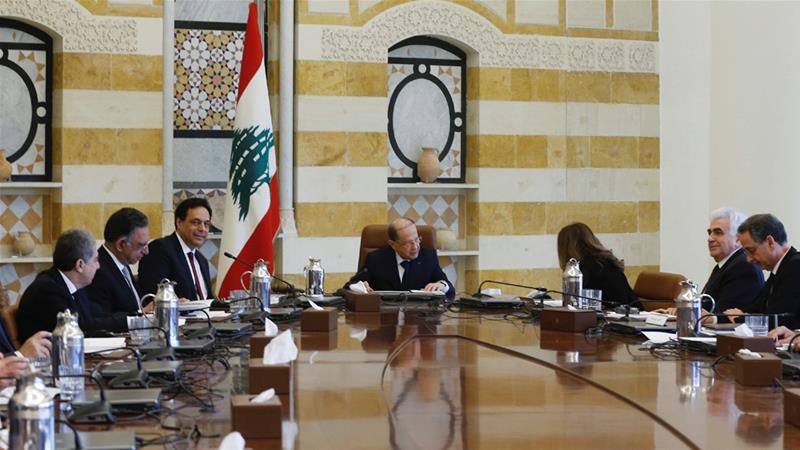
- ARAB NEWS
- 15 Jul 2025

A genuine effort could have been made to listen to popular grievances and forge a new, transparent model of governance. Instead, the same corrupt old cliques colluded together and then collectively spat in citizens’ faces. This is a leadership unwilling to countenance change — unwilling to loosen its teeth from Lebanon’s neck as it continues extracting the nation’s lifeblood.
If ministerial appointments were “non-partisan,” “independent” figures, as incoming Prime Minister Hassan Diab claims, what were the weeks of factional haggling, bidding and brinkmanship all about? If you want to appease citizens, instead of further provoking them, stop treating them as ignoramuses, unable to comprehend what is happening before their eyes.
Plucked out at random, today Diab is a useful, but impotent, place-filler — ticking the necessary sectarian boxes yet representing nobody. Tomorrow, when he has fulfilled his purpose, he will be summarily disposed of. The finalized list of appointees was submitted to Diab as a last-minute fait accompli by President Michel Aoun and Speaker Nabih Berri. I wonder who will pull the strings in this new administration.
This government is calculated to remind citizens — as if they needed reminding — why the corrupt, discredited old sectarian system must be allowed to die. Ministries will continue operating as private cash farms and employment providers for the benefit of key factions. The appointment of figures like Mohammed Fahmi — previously notorious for his extreme proximity to Damascus — tells us all we need to know.
There are fears that, once the ink is dry on the Cabinet agreement, there will be a purge of security personnel sympathetic to the protest movement, allowing for a definitive crackdown. Tehran has been telling Hezbollah that it is time to enforce order on Beirut’s streets — whatever it takes.
However, as Walid Jumblatt and other veterans have urged, this “rescue” government should be given a chance. New Finance Minister Ghazi Wazni, an economist, should be given space to perform open heart surgery on the nation’s finances. He should be allowed to introduce radical reforms — including measures that would anger vested interests — to open the door for support from the World Bank and other foreign donors and investors.
After decades of systematic theft from public sector budgets, Lebanon is the world’s third most indebted country, with a 152 percent debt-to-gross domestic product ratio. The ongoing crisis has harmed small businesses and the communities least able to bear the financial pain. Meanwhile, the elites withdraw their wealth unmolested, while profiting from sharp price rises and currency fluctuations.
It is, nevertheless, refreshing to see a Cabinet containing five women, including Zeina Akar, who will perform the not insignificant roles of defense minister and deputy prime minister.
The question is not whether this government will be rejected, it is how the key power brokers will react when a critical mass of Lebanese citizens have voiced their rejection. While it is in everybody’s interests to see new ministers stemming the bleeding from Lebanon’s financial system, citizens are already out on the streets making it crystal clear that this regime is on borrowed time.
The uprising is entering a new phase, requiring a more sophisticated approach. Vague demands for change and the rejection of sectarian factions are no longer sufficient. The lack of leadership within the protest movement initially made it beautifully democratic and inclusive, but also allowed it to be ignored and outmaneuvered by entrenched powers. The movement must now roll up its sleeves and enter the political arena as a post-sectarian, trans-communal force to sweep the old order away.
This government is calculated to remind citizens why the corrupt, discredited old sectarian system must be allowed to die.
Baria Alamuddin
Activists and intellectuals must conceptualize what a post-Taif Agreement governing system should look like. How can accountability, transparency and effective governance be enshrined within a new constitution? How can communities and minorities be represented without surrendering power back to white-haired warlords? How can Lebanon’s sovereignty and national identity be protected against hostile foreign interests?
A plurality of nations regards Hezbollah as a terrorist movement. Its participation in government (directly or indirectly) is a red line for donors. If Hezbollah wants to avoid being swept away as Lebanon’s sectarian system is dismantled, it must abandon its weapons and dependence on Iran.
Lebanon is an inherently diverse nation and no single faction or agenda can be allowed to monopolize its governing system — particularly sectarian parties that threaten its sovereignty, independence and civil peace. Lebanon’s geriatric leaders have proven their unwillingness to change; therefore they must be changed.
Baria Alamuddin is an award-winning journalist and broadcaster in the Middle East and the UK. She is editor of the Media Services Syndicate and has interviewed numerous heads of state.